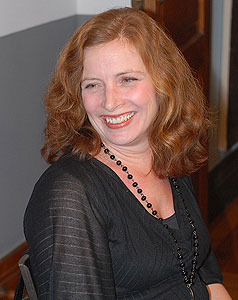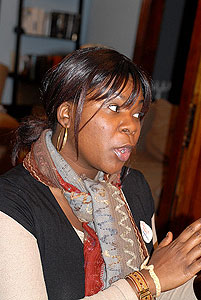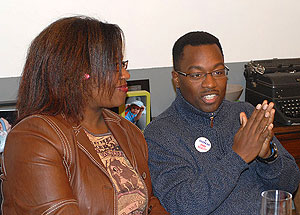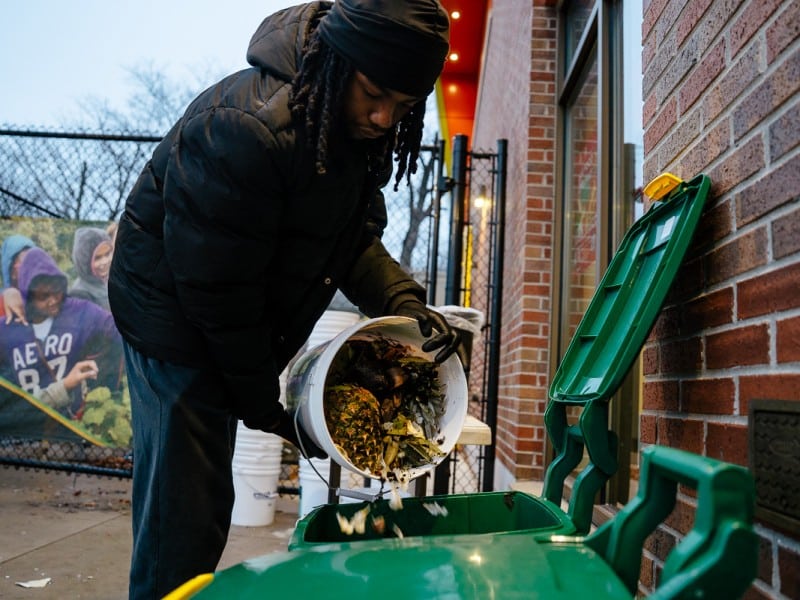Families Matter
These
parents are frank. Detroit is not for every family, and it’s not quite
“easy living.” But they’ve chosen Detroit over the ‘burbs — and they
talk with Model D about why.
Let’s face it, some people think raising your kids in Detroit is
borderline child abuse. If you’re a Detroit parent, you know there’s no
end to the sneering questions people ask about raising kids in the
city. If you’re not, then you may be surprised by how many people, who
could easily put down roots elsewhere, have chosen Detroit — and
wouldn’t have it any other way. Meghan McEwen gathers a panel of city
parents for a discussion about what it’s really like.
The panel:
• Jim Griffioe, who recently moved from San Francisco, is the father of a 2-year-old daughter and writes a blog, www.sweetjuniper.blogspot.com.
• Faith Howard-Drain has two children ages 5 and 22 months.
• Jackie Victor is the mother of two children, ages 6 years and 17 months.
• April Boyle has three boys ages 7, 5 and 5 months. (Her husband Brian Boyle is a co-founder of Model D).
• Sylvie Malo has a 6-year-old son and teaches at Friends School.
• Tony and Annette Kinsey are the parents of three boys, 13, 7 and 5.
MEGHAN
McEWAN: As the mother of a 6-month-old, the question I get all the time
is: “So when are you moving to the suburbs?” I think that’s the biggest
myth — that everyone moves to the suburbs when they have kids. Since
this is a panel of parents who didn’t, let’s start by explaining what
makes Detroit a good place to raise children:
JACKIE:
I have to say that Detroit is not yet a great place to raise children.
I think that it has great things to offer families, but I think it’s
for families who have a different consciousness. I want our children to
grow up in a home where they experience a family who’s committed to
something larger than ourselves. And that’s a big reason why I’m in
Detroit.
Because of the lack of healthy institutions, in a lot
of ways, there is more of an opening for individuals to make more of a
difference. Our business — we own Avalon Breads — is a perfect example.
We couldn’t do it in San Francisco, trust me. Or Atlanta or New York
… As families we can create institutions and some things here that
maybe we wouldn’t be able to so easily create somewhere else, where
everything is already done. There’s a lot of room for creativity and
for creation here.
 SYLVIE:
SYLVIE:
I agree with Jackie. I don’t think it’s a great place to raise kids.
But I’m committed to raising kids in an urban environment, and I’m
making it work. But I don’t think it’s very easy. I can afford to send
my kids to a private school, but if you can’t, it can be a problem,
depending which neighborhood you live in. I was raised in a city and so
was my husband, and we’ve never spent a day of our lives living in the
suburbs, and I couldn’t imagine raising my kid there. You have to be
creative, you have to be committed. It has to be a project, and you
have to know why you’re doing it. …
APRIL:
I think that people think that we’re delusional—that we don’t know
about the bad things. And we do know. But it’s not enough to make us
run away, to stop us from our commitments to all these things we think
are more important than the illusion of safety in the suburbs. So I
think that’s a major myth: we are aware that it’s not perfect …
JACKIE:
I have become much less judgmental about people moving out of the city,
because a lot of people can’t afford to live in the city anymore
because of high taxes and school tuition and insurance. People are
financially pushed out of the city who would stay. I feel like I’m in a
privileged position, being able to send my daughter to Waldorf and
living in a neighborhood that’s safe. So I don’t want to say that
people who move to the suburbs move for bad reasons: I think they do it
for good reasons.
The other great thing about living in this
city is there is such heart. … We opened our business 10 years ago, and
it was on a song and a prayer, and the amount of love and support and
gratitude that we have received is so much more than what we have put
into it, I can’t even find words for it. I find that when there is a
gem in the city, people will gather around it and they are like
warriors about it. They want things to work so much. So the one
beautiful thing about it: my daughter, my kids, they will grow up with
a sense of gratitude. …
APRIL:
One thing that is a concern for me is not getting caught up in
continuing to buy a bigger house and the bigger lots and the consumer
culture of the suburbs. I think living in the city, you can kind of
shield your kids or shelter them away from that a little bit.
JACKIE: Yes, I love that.
FAITH: I agree.
MEGHAN: What are some other myths that you guys are dying to dispel?
APRIL: That
there aren’t families living in the city. I think that’s a myth. That
people think it’s just drug addicts and…I don’t know what they think!
FAITH: That everybody here is stuck. That we have to be here. We don’t have to be here. We choose to be here.
TONY: Or that it’s so scary you can’t even walk to your car.
APRIL: Like we’re in a war zone or something.
TONY:
That you can’t go jogging or ride your bike, and that it’s just so
scary and far from reality. The area we’re in, people are worried about
the bums. But you know, I’m going to ride my bike. I’m going to do
whatever I need to do to be normal, because we bring normal. If you
can’t jog down your street or walk with your kids, then the thugs have
won.
APRIL: And that there are thriving neighborhoods — really nice, well-maintained, beautiful places to live in the city.
SYLVIE:
I think that is something that suburbanites don’t know. They go
downtown, but they don’t’ know about our nice, little neighborhoods.
JACKIE: The housing stock here is phenomenal.
FAITH: You can’t get better.
JACKIE:
No, you can’t get better. Really, our standard of living here is so
much higher than it would be in another city. We have a great house
that in a million years we couldn’t afford somewhere else.
DUTCH:
I was in San Francisco, in a two-lawyer household, and we were living
in a one-bedroom apartment with our baby for 19 months. My wife does
public interest law, and we just couldn’t buy a house there. And now
we’re living in 1,500 square feet, and it’s the most luxurious
environment.
JACKIE: And that’s small for Detroit…
SYLVIE:
And that’s the payback for being a pioneer. Although I don’t consider
myself a pioneer at all. I live in Corktown, which is a neighborhood
that was pioneered 25 years ago. But now, it’s kind of easy.
JACKIE: Well, Faith, where you’re living…I feel like you’re a pioneer…
 FAITH:
FAITH:
Definitely. I used to call it living amongst the ruins, because you
have a bunch of mansions that are bequeathed to people who don’t care
what they turn into. You have bombed-out places, but your house is
there, and this is where you prefer to be.
The welcoming
committee for my neighborhood was being robbed at gunpoint. I was
single then, and everyone was like, “Get out, get out.” But I cannot
run. This place used to be a safe haven. It was a place I played
hopscotch, and my aunt used to watch me in this house. … This house
was a mansion to me. Whenever I walked up to this house, I was like
“[Gasp] I’m going in the castle.” And still it’s a castle to me, but
amongst ruins. Now I have children, so my priorities have shifted, but
I still want my girls to have their castle…
MEGHAN: Some
of the trash talk is true. Not all, but some. So what are the hardest
parts of raising kids in Detroit? And how do you negotiate that?
FAITH:
I think you have conversations every other week about staying. Every
time you come up to your house … “Are we staying? Are we staying this
week? Are we leaving this week? No we’re not leaving.” We have good
neighbors move in, then we have renters move in, so you don’t know who
you’re going to wind up with, but you hope it’s someone who loves your
block as much as you do. And I have all these older people on my block
who I don’t want to leave to just anybody…so it’s a big battle all the
time about what you are going to do next week. Are you safe? Are you
scared coming in late? …You pray, you become more cautious. You don’t
want to be hyper vigilant. You say, “I won’t pull up Grosse Pointe on
Century 21 one more time, I won’t.”
[Laughter]
SYLVIE:
For me, the hardest thing has been having kids around to play with my
son. I have an only son, and he needs friends. He’s very friendly.
Where I live, it’s a cool neighborhood. There are a lot of hip people,
but not a lot of children. And that’s a problem. … So we have to be
extra creative. Of course I love the school my son goes to—it’s Friends
School—and that has become the neighborhood. …
JACKIE:
I was experiencing some guilt. I was so clear about my political … and
just personal choice. I don’t want to live in the suburbs; I want to
live in the city. I love my house, I love my neighborhood, I love all
that stuff. I was so clear it was the right thing. Then my daughter
became 4, 5, and now 6. And a lot because we’re Jewish, and she went to
preschool in Oak Park and the whole community is there, and she made a
lot of friends there. And the whole community lives in Huntington
Woods, where there’s tons of recreation, and everyone lives in each
others’ houses. And I do find myself feeling guilty, like am I being
selfish? …
 TONY: I think
TONY: I think
the school thing is always going to be looming over our heads, if we’re
making the right decisions. Our oldest son, he’s 14, and we were
driving all around. We weren’t at the local school. Even now, he goes
to a West Side school and we live on the East Side. And I was thinking,
‘Is this right?’ … But I realized when we had more children and as we
debated about the move, I think you’re going to have issues wherever
the kids go to school. Even if we moved to Grosse Pointe—that’s where
all the East Siders want to live—we’re going to have issues wherever we
go. If there are only five black kids in the whole school, you’re going
to have that issue. If it’s all black, that’s an issue, too. …
FAITH:
The school thing won’t change for me, because I’m happy with Detroit
Waldorf. I love Waldorf. Even if we moved to Grosse Pointe, we would
stay at Waldorf. Our neighborhood school, I don’t know what that is. It
was never a choice.
But we’re living in Detroit and raising our kids here for a reason. I want to hear more of those reasons.
APRIL:
I don’t know all you guys, but I bet I’ll run into you in the next week
or two, because Detroit is the biggest small town in the world.
Everybody is one degree of separation away from another person. … You
[Jackie] said to me, ‘It’s a very spiritual place to live.’ When you
get together, you love these people. You know that you have things in
common with them. You all share a sense of depth, and you’re here for a
reason—to be a part of something bigger than yourself. I don’t find
that a lot when I’m at Somerset Mall or some of the suburban
environments that I’m in. There aren’t a lot of these conversations
going on—about being a part of something.
SYLVIE:
When we first moved to Detroit, everybody said, ‘You can’t live in
Detroit. You’ve heard the stories.’ What struck us from the get-go was
how interesting and friendly people were, and that’s what kept us here,
for sure. We like people in Detroit: they’re all crazy. You have to be
a little crazy to live in this city. You have to have a mind that is a
little more open. You have to be a little more adventurous. You have to
be a little more of a risk-taker. You have to be all these things, and
I like being around them. I would like my son to have an open mind,
too. To me, that’s the big advantage. That’s why we’re here.
JIM:
For me, part of the biggest attraction to Detroit is that it’s an
absolutely beautiful city. And I want to raise my daughter with that
sort of appreciation. I want her to have an aesthetic where she looks
at these buildings, even the rotted-out buildings, and understands that
there’s a history and a reason and a story behind all of these places.
I
walk around the entire city with my daughter. I take pictures of her in
front of graffiti. And no one ever bothers us. Again, it’s the most
beautiful place I have ever been—and I’ve traveled all over the world.
You
go out to the suburbs…every Outback Steakhouse looks like every other
Outback Steakhouse in every other suburb across America. There’s
nothing in Detroit like an Outback Steakhouse. There’s so much more
here than that.
TONY: I
think it’s beautiful. We live five blocks off the river. Where else can
I live off the river for under a half million dollars?
MEGHAN: Let’s talk about the camaraderie of Detroit parents. How does the sense of community here shape your experience?
JACKIE:
We’re just starting … You have to be very scrappy, and you have to
piece everything together. I was having some discussions with some of
my sort of political allies, and we started talking about this vision
of Detroit being the greatest city for kids, but in an unconventional
way. So we got together as a group of people, and we came up with this
idea of Detroiters Dream for Children (e-mail: detroitersdream@yahoo.com), so we’re creating it as we go.
ANNETTE:
To create camaraderie is essential, because I’ve been a stay-at-home
mom for 14 years. And what I began to do was seek out mother clubs,
like I was a part of Mocha Moms. You go to the Detroit Public Library
at 10:30 a.m. every day, and you see a lot more home moms. You have to
begin to create and step out, and say, ‘Hey, can I get your number. I
would love to get together for a play group.’
SYLVIE:
Every time I see a little boy or girl who seems to be the same age as
my son, I say, ‘Where do you live? Can I get your number?’
ANNETTE:
You would be surprised how many home moms there are. When I go out to
the suburbs, they’re like ‘There are African-American home moms?’
They’re blown away.
SYLVIE: That’s the thing. You can do it in Detroit.
JACKIE: I know so many people who live simply in the city so one parent can work.
ANNETTE:
You have to build your world…When we bring our Mexican and white
friends to the table, our children are like, ‘This is truly what Mom
and Dad believe in.’ That’s how you begin to build camaraderie. I
believe in building a community, where my children can have diversity
in every aspect of life.
Meghan McEwan is a freelance writer who lives in Corktown.
Photos:
Jackie Victor with her Children
Sylvie Malo
Faith Howard-Drain
Tony and Annette Kinsey
All Photographs Copyright Dave Krieger




